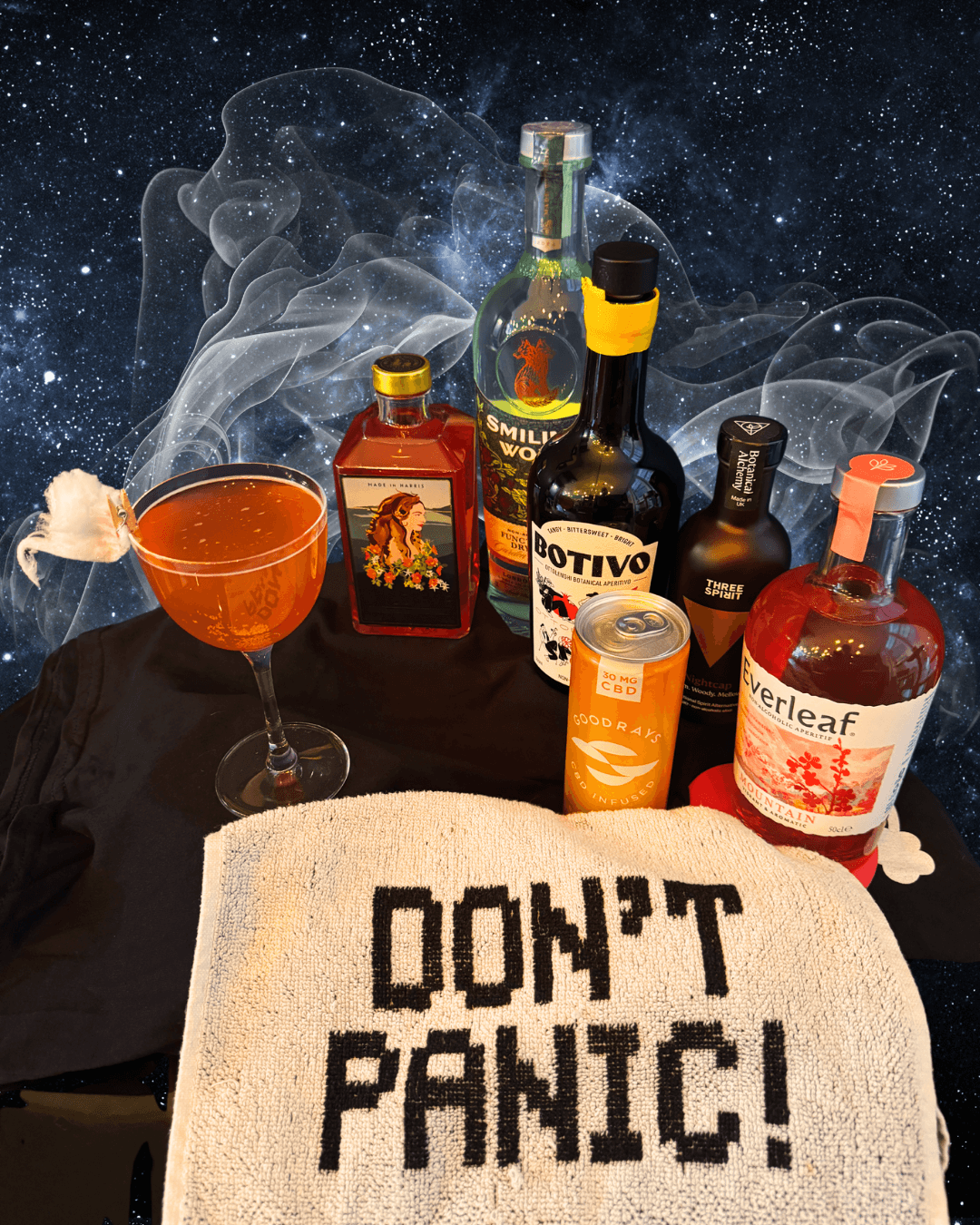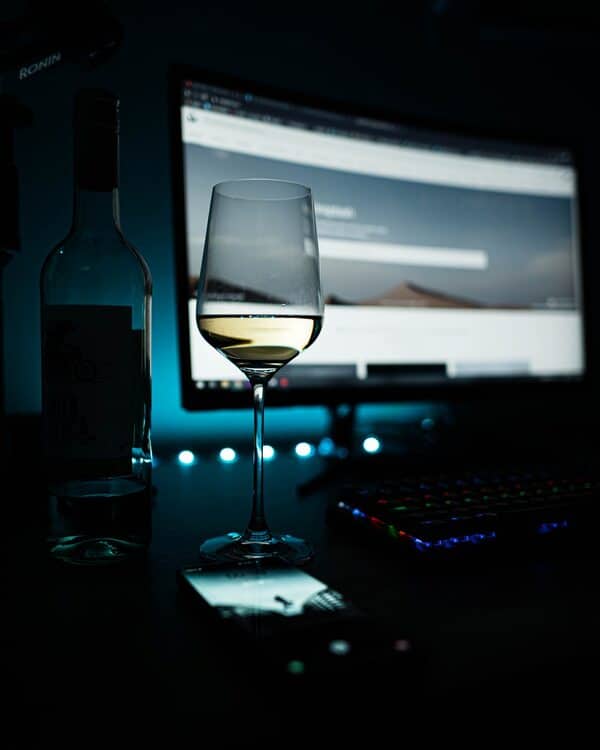
This website uses cookies to improve your experience. We'll assume you're ok with this, but you can opt-out if you wish. Read More
The Next Round: What happens after you change your drinking?


“We’ve come a long way from the ‘all-or-nothing’ thinking of the 90s and that has to be due to the internet and online connection”
In a world that is constantly reinforcing the idea that drinking is a positive, celebratory pastime, it’s easy to think that if it’s not a positive force in our lives, the only alternative is to quit. This has certainly been the mantra of many well-meaning recovery groups of old, and while this idea is now seen as old hat, the idea of can moderating still feel vague. But as online communities such as Club Soda become the melting pot for all types of drinkers, have the old lines blurred and new, more open-minded approaches become more solid?
Alena Sagen is a marketer, artist, and author of the website Steady Sober Woman. Having spent many years struggling with her drinking and taking her time to work out what moderation means to her, she finally took the plunge and began her own moderation journey last year, which she documents in her recent short memoir and blog about online connection. Alena is based in the US but spent nine years living in London and picked up on many drinking traits and many more approaches to moderation by observing both types of drinking culture.
Tell us when you started to consider how you could change your drinking?
I’d struggled for a long time to work out what I wanted to do about my drinking. I was unhappy with my habits and knew that something needed to give, but I didn’t know what. I’d read a lot of literature about changing your drinking, but most of them were just about quitting (and most of them were British!). It was still reinforcing the idea that it’s all or nothing and that if you have any alcohol at all, you’re a failure. I didn’t believe that idea at all, but back in the 90s, quitting was the only solution available.
When did the idea of moderation become something that fitted your lifestyle?
For me, my rock bottom was a lot more subtle than ‘Oh god, I’m going to lose my family and friends and property’. It all stemmed from going to get my annual physical at the doctors. At my previous appointment, my doctor had told me that I needed to cut down my drinking. The way that they knew that I was drinking too much is that they checked for the presence of an enzyme that indicates the condition of your liver. Mine was really high the last time, so I tried to prepare myself for the physical so that I could fool the doctor. So, I’d stop drinking right before the appointment – it was a joke.
I learned more about moderation because of this physical examination. I learned that this enzyme would not change from a few days of abstinence, not even a month. I needed some real down-time for my body to reset itself, and so I cut down for the first time in 20 years.
So, what was your goal? To reset your body between annual appointments or to take the opportunity to create the changes you’d been thinking about?
Honestly? I felt so much relief after my physical that my brain said ‘OK, now I can go back to my daily wine’. But now I knew too much about how it was affecting my body and I just couldn’t do it.
All I kept asking myself was why was I trying to please the doctor over myself? It wasn’t about the results of an examination or a doctor’s report, it was about knowing what I really wanted for myself.
Instead of going to the liquor store on the way home, I went to my favourite tea shop and just sat and read. It was a night I’ll never forget – it was my personal test to prove to myself that I could do this just for me.
What did the first steps into your moderation journey look like for you?
I guess I had been taking steps even before I really realised what I’d been doing. Caroline Knapp’s book “Drinking: A Love Story” really influenced my thoughts about drinking even though it’s a book about total abstinence. The idea of being an alcoholic has never resonated with me – I understand the struggle that some people have if they don’t have a name or a label for their condition, but I’ve always felt that it’s a personal journey for everyone and that there’s never a ‘one size fits all’ solution.
Due to a combination of wanting to find more literature, being curious and the increase in online communities and the chance of online connection, I was able to help myself find different options to those old tendencies towards quitting. Some people need guiding in the direction of structured help, but for me, doing the research online myself was part of my awakening. We’ve come a long way from the old singular solutions in a really short space of time and that has to be because of the internet and the online connection and idea sharing that has given us. That’s how I came across the Club Soda community, of which I am a member. We’re so lucky to have online outlets like this which allow us to challenge old-fashioned views and have a real conversation about different ways of drinking.
In your blog you talk a lot about the science of addiction and its effects on the brain. Did this knowledge help you in the early days of trying to moderate?
I am in no way a scientist, but the scientific elements of addiction really intrigue me. I think it’s really crucial that we understand the relationship between addiction and brain functionality before we can fix our own behaviours.
It’s not about having some sort of disease – if it were a disease, there would be a race for a cure! It’s about the behavioural patterns that occur if you feed the brain chemical addictive substances over a significant period of time. The assumption that it’s a disease does not sit well with me because once they start, you don’t have any control over these patterns and the brain starts thinking that this is normal behaviour – you’ve impaired the way in which your brain functions.
Thankfully, now that I’ve been moderating for a while, these patterns have decreased, and my tolerances have changed. I can’t have more than three glasses of wine without falling asleep…this is a positive thing for me!
Your blog discusses the mindfulness with which you approached moderation: can you tell us a little more about that?
Sure; it had a lot to do with my brain beginning to repair itself and then my being able to change my mindset. I used to think the idea of having one glass of wine and then putting the bottle back in the fridge was absurd! I’m so far away from that now, but it took a long while to get there.
At first, I felt a lot of guilt about not abstaining completely, but guilt was a behaviour that my brain was used to. I went 5 days without drinking, then I had a couple of glasses, then another 5 days without, then a couple of glasses…I found a pattern that helped me get a handle on things. I like having a nice glass of wine with a decent meal, and I learned that I could enjoy it instead of abuse it. Once I saw that it was possible to moderate, that guilt went away, and I got over myself!
I can do things differently now, but I had to walk through it to know it. In my early days of moderating, I met up with my brother who also has issues with his drinking. There wasn’t a day in our childhood where alcohol wasn’t present, and that’s had a lasting effect on us as adults. We met up for dinner, but instead of moderate, we fell into our old toxic routine and I drank. I woke up the next day feeling awful; this was the stage where I realised that it wasn’t just a decision, it was a journey, and it would have to be one step at a time, making mindful decisions every day. Moderation means that sometimes you have to crash through your own boundaries to know where they are.
Do you have any tips for people who think that moderation could be the right path for them, too?
Absolutely – I wish someone would have told me to be kinder to myself in the beginning! There’s not an easy button no matter where you are in your journey, so try and see your journey as one of discovery rather than success or failure. Rather than see boundaries as brick walls you’ll never get past, try and see them as learning opportunities. I had a lot of limiting beliefs about myself, but I’ve learned that in this journey of self-awareness, you can’t pigeonhole yourself!
Changing your mindset won’t happen overnight, either, it’s a gradual thing, so be patient. I always wanted to go to Art School, but instead, I did an English degree at University. So, I used to tell myself that because I wasn’t part of the art world, my art wasn’t good enough. So instead of trying, I drank. I found that when I stopped drinking, I started trying, and while I’m not perfect, who cares if what I produce isn’t the culmination of 4 years at Art School? Once I gave myself permission to change one really important thing – my drinking – I became more open-minded about what else I could do and more mindful of my approach to myself. And now that my brain isn’t constantly distracted by where the next drink is coming from, I have more focus on the things I love doing without the anxiousness about whether it’s any good!
If you’re going to try moderation, my main tip is to make online connection and be part of a community such as Club Soda. Try sharing your experiences with others, including failures and bad days, and get feedback from others as much as possible – it gives you much more of an incentive. And having an open conversation about what works for you could help someone else learn what works for them; it’s never been about all or nothing, and there’s a new digital generation that’s changing that mindset for the better, so get involved.

To read more about Alena’s story, visit her blog at www.steadysoberwoman.com or download her eBook, ‘No More Waiting: A Story of Moderation After Decades of Drinking’ from Amazon UK or Amazon US or Amazon AUS.
This website uses cookies to improve your experience. We'll assume you're ok with this, but you can opt-out if you wish. Read More
| Name | Domain | Purpose | Expiry | Type |
|---|---|---|---|---|
| wpl_user_preference | joinclubsoda.com | WP GDPR Cookie Consent Preferences. | 1 year | HTTP |
| PHPSESSID | www.tickettailor.com | PHP generic session cookie. | 55 years | HTTP |
| AWSALB | www.tickettailor.com | Amazon Web Services Load Balancer cookie. | 7 days | HTTP |
| YSC | youtube.com | YouTube session cookie. | 55 years | HTTP |
| Name | Domain | Purpose | Expiry | Type |
|---|---|---|---|---|
| VISITOR_INFO1_LIVE | youtube.com | YouTube cookie. | 6 months | HTTP |
| Name | Domain | Purpose | Expiry | Type |
|---|---|---|---|---|
| _ga | joinclubsoda.com | Google Universal Analytics long-time unique user tracking identifier. | 2 years | HTTP |
| sbjs_migrations | joinclubsoda.com | Sourcebuster tracking cookie | 55 years | HTTP |
| sbjs_current_add | joinclubsoda.com | Sourcebuster tracking cookie | 55 years | HTTP |
| sbjs_first_add | joinclubsoda.com | Sourcebuster tracking cookie | 55 years | HTTP |
| sbjs_current | joinclubsoda.com | Sourcebuster tracking cookie | 55 years | HTTP |
| sbjs_first | joinclubsoda.com | Sourcebuster tracking cookie | 55 years | HTTP |
| sbjs_udata | joinclubsoda.com | Sourcebuster tracking cookie | 55 years | HTTP |
| sbjs_session | joinclubsoda.com | SourceBuster Tracking session | Session | HTTP |
| Name | Domain | Purpose | Expiry | Type |
|---|---|---|---|---|
| mailchimp_landing_site | joinclubsoda.com | Mailchimp functional cookie | 28 days | HTTP |
| __cf_bm | tickettailor.com | Generic CloudFlare functional cookie. | Session | HTTP |
| NID | google.com | Google unique id for preferences. | 6 months | HTTP |
| Name | Domain | Purpose | Expiry | Type |
|---|---|---|---|---|
| _ga_10XZMT03ZM | joinclubsoda.com | --- | 2 years | --- |
| AWSALBCORS | www.tickettailor.com | --- | 7 days | --- |
| cf_clearance | tickettailor.com | --- | 1 year | --- |
| VISITOR_PRIVACY_METADATA | youtube.com | --- | 6 months | --- |
Join Club Soda for 10% off your first order of drinks for UK delivery. Plus get our latest news and special offers for members to choose better drinks, change your drinking and connect with others.
If you get an error message with this form, you can also sign up at eepurl.com/dl5hPn